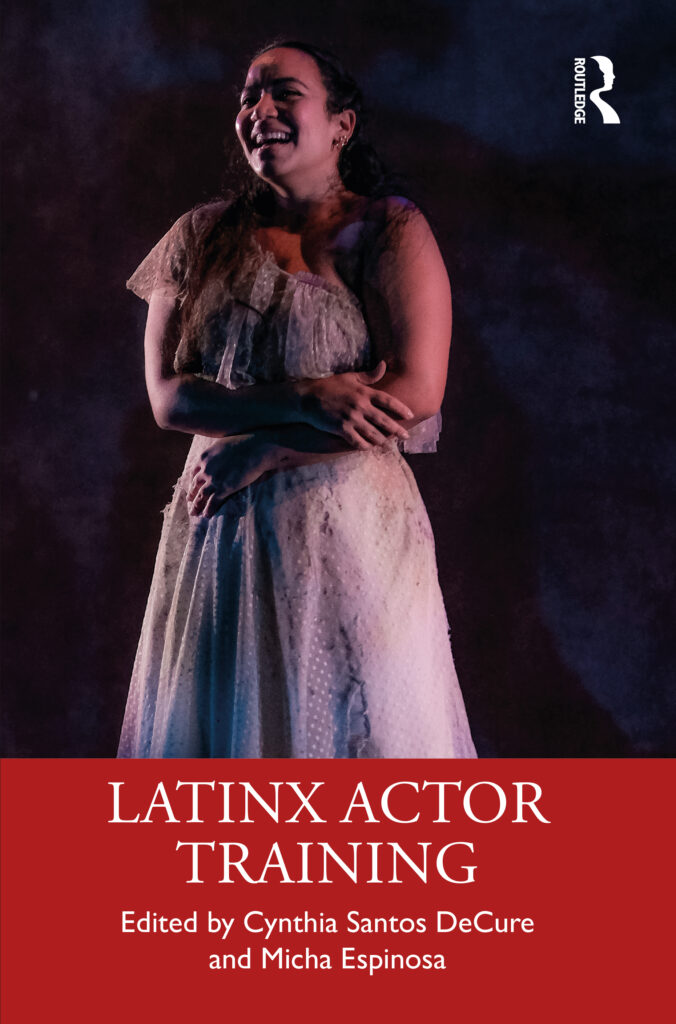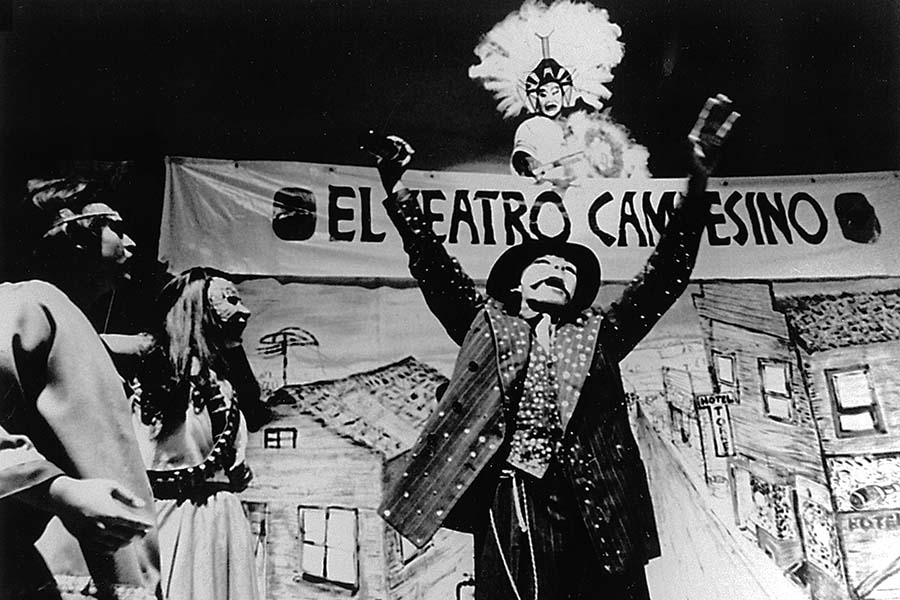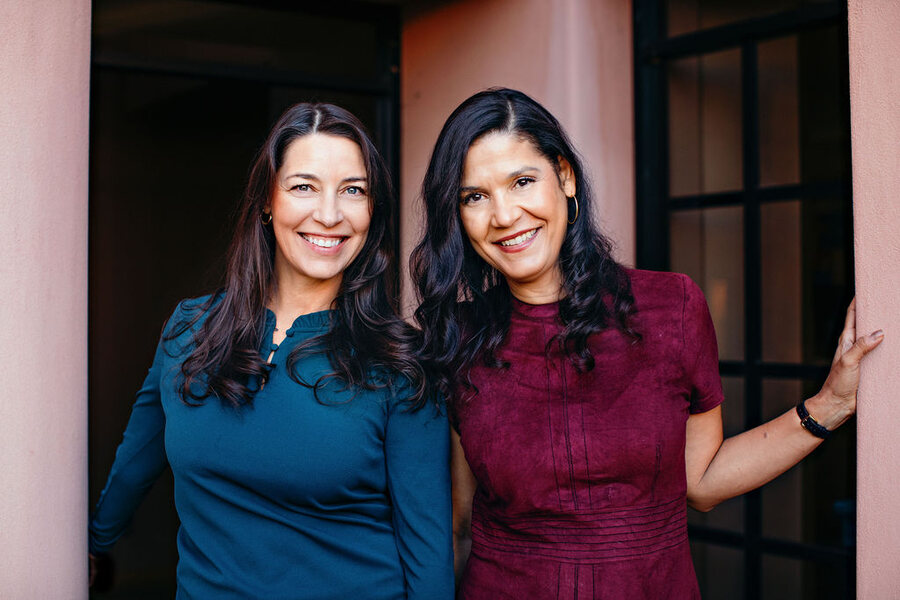The following is an excerpt from Latinx Actor Training, a new book from Routledge by Latinx practitioners and scholars, edited by Cynthia Santos DeCure and Micha Espinosa. This chapter was written by Micha Espinosa.
The Complexity and Poetry of Latinx Identity and Actor Training, a Narrative
Not barrio enough Chicana
Only an academic Chicana
I’ll find a coupon for anything Chicana Muggle Chicana
El Rey loving Chicana
Right to choose Chicana
Take care of my mama for life Chicana Spoil my prince Chicana
Non makeup wearing Chicana
No spanks Chicana
Embarrassed by my Spanish Chicana Empowered by my Spanglish Chicana Latines, Latinx, Latin@ Chicana Google Translate Chicana
Won’t handle your Machismo Chicana Can’t handle my tequila Chicana
I hear mescal is better for me Chicana Joder Marianismo Chicana
Take a Knee Chicana
Cholas Matter Chicana
Forgot my hot sauce again, Chicana!

Not Barrio Enough is an identity poem that was published in 2020 for Glossolalia, a multilingual poetry experiment produced with La Pocha Nostra. I begin with poetry because throughout the essay I merge my creative and scholarly voices. I am a spoken-word performance artist, actor, coach, and a professor in the School of Music, Dance, and Theatre at Arizona State University in Tempe, Arizona. I teach a variety of voice and acting classes at the university in a multicultural environment. For purposes of this chapter, I will focus on the teaching of Latinx students. I offer insights and best practices, coupled with quotes from Latinx students from the recent past and present, and from Latinx luminaries in the field. These quotes allow us to hear “the voice of the student,” signal changes in thought, and affirm that Latinx students in actor training need to be met with cultural knowledge and understanding.
This work builds on my creative research in and dedication to Latinx actor training, which began in the early 2000s. I use narrative memory as a springboard to examine the complexities of discovering one’s voz cultural (cultural voice). I put myself at the fore to incorporate history into meaningful learning that I can share with my fellow actor-trainers. I teach and write from my wounds (a concept and now a practice given to me by my mentor, Catherine Fitzmaurice).
My upbringing, training, and education in the late 1980s assumed meritocracy, exceptionalism, and assimilation. Like many Mexican Americans of my generation, assimilation into U.S. society meant English-only at school. Throughout my childhood, I was directed to become American, and that identity was singularly defined for me by every internal and external force in my life.
In fact, I did not see myself represented until I went to graduate school at University of California, San Diego (UCSD). At UCSD, I met the renowned historian of Chicano theatre Prof. Jorge Huerta, my very first Latino professor ever. Just meeting him and knowing he existed changed my life. Not until graduate school did I learn that Latinos created theatre for Latinos. Not that I wasn’t curious or not looking for this history of my field, but my education had directed me toward only Anglo-American theatre. Moreover, Huerta ran a program devoted to training the Hispanic actor! I was in the “traditional” actor training program, but the Latinx cultura on campus—with students, playwrights, guest artists, designers, directors at UCSD during those years (1990–1994)—was exciting.
Learning parallel to the students in Huerta’s Hispanic Acting program, I saw how I fit into the traditional program yet how I did not. I deeply felt the invisibility of my biculturalism and the shame of speaking Spanglish and having an Arizona accent. I remember feeling that I was both not Latina enough and, at times, too Latina—Ni de aqui/ni de alla.
At UCSD, I also learned about Chicanos, a chosen identity for American people of Mexican descent. Nowhere in my upbringing in Arizona had I been exposed to Chicano culture—Mexicano, claro que si, but not Chicano. In that Chicano culture, I discovered a politically oriented identity. The Chicano identity rejected stereotypes, embraced Spanglish, aligned with the global majority, celebrated bi-nationalism, and spoke to the greater Southwest, the region that my family was from.
While I began to study and learn about the complexities of the Chicano movement, one of many social justice movements that have become important to me, I went to my first MEChA (Movimiento Estudiantil Chicano de Aztlan) meeting during my time at UCSD. I was also introduced to the work of Luis Valdez’s Teatro Campesino and, subsequently, to the heroes of the farm workers’ movement, César Chávez and Delores Huerta. I had the honor of working in the same spaces and having conversations with Chicano artists, like Culture Clash (Richard Montoya, Ric Salinas, and Herbert Sigüenza). Learning Chicano history and joining with a Chicanx-identifying community gave me a path toward finding my own authentic voice—a voice that could integrate my past and my culture.

Understanding and exploring my cultural identity helped me navigate my identity as an actor. That didn’t mean it wasn’t confusing and full of challenges, but it gave me a place to begin to value my hyphenated, mixed-blood, border-crossing ways.
Early on as a teacher in the academy, I found that institutions wanted me to replicate those same practices that had made me feel unseen and unheard as a student. Usually, I was the only Latinx faculty member, and although it was hard to be a sole voice, I began to stake boundaries and push back. I realized that I did not want my students to have the same experiences I had had. I wanted to equip them for the field and, more importantly, for life.
I dived into Latinx Literature and theatre studies, Chicano psychology, Chicano anthropology, critical race theory, Latino critical theory, border theory, liberation theory, feminist and gender studies, and trauma-informed voice and acting practices. In addition, I immersed myself in the national and local social justice movements and theatre in service of staying actively connected to the current and emerging voices in the Latinx sociopolitical sphere and also to be able to provide a fabric of network opportunities with Latinx theatres across the United States. Lastly, I discovered the work of Guillermo Gomez Peña and La Pocha Nostra, which gave me a container to subvert stereotypes and to perform and write from my truth using my Chicana identity, politics, and aesthetics. My immersion in these subjects and pedagogies allowed me to self-define and position myself as a bicultural feminist with a voice.
I wanted to prepare my Latinx actors so they could understand the perils of the industry, value their unique offerings, and speak truth to power. As my mentor, Catherine Fitzmaurice, taught me, “One should teach what is in front of them.” To that end I had to be conscious of the overt and underlying realities, beliefs, and values of being part of the Latinx diaspora. In Paulo Freire’s essay “Cultural Action and Conscientization,” Freire defines “conscientization” as “the effort to enlighten men about the obstacles preventing them from a clear perception of reality. In this role, conscientization effects the ejection of cultural myths that confuse people’s awareness and make them ambiguous beings.” Luis Valdez’s acting philosophy resonates with conscientization: “As actors in life, we must all seek truth to the root, reaching for a holistic consciousness that will liberate us from our own irrationality.”
I invite this heightened state of knowing that Freire describes, and, like Valdez, I find it fundamental to actor training. This critical consciousness is imperative to developing authenticity. To that end, in preparation for this article, I used the critical consciousness that Valdez and Freire invoke to write a journal of narrative memory of my early actor training. This painful remembering might be retraumatizing to others if shared.
In summary, I was subjected to damaging eroticized stereotypes. I experienced sexual harassment from producers, directors, photographers, and other players in my training and in the industry. I also faced the challenges of balancing a career with the traditional expectations of familia, and I struggled to break free of toxic, old-world belief systems that were part of my Mexicana upbringing. My Mexicana values of simpatía and marianismo did not empower me and, therefore, left me vulnerable to the brutality of a misogynistic and patriarchal profession. I wrestled with my reclamation of Spanish and the reimagining of my Chicana activist identity. I remembered not only mentors and education opportunities that had provided moments of impact that empowered my cultural voice, but also others that silenced me. I remember moments of belonging and moments of isolation and othering.

Author Penelope Harnett, in Exploring Learning, Identity, and Power Through Life History and Narrative Research, confirms my process of reflection: “Narrative is valued across a range of subject domains. From the beginning of time, it has been a feature of humankind to explain the present through recourse to the past.” She further states: “Stories of individual lives are also important as acts of remembrance ensuring that certain events and episodes of the past do not fade into obscurity.” By remembering and examining my journey, I am able to question and exploit my identity to better understand myself, my agency, and my relations with others. Betty Franklin Smith, a scholar of the Theatre of the Oppressed, offers insight into how inner exploration leads to understanding:
Placing ourselves at the struggle of transformation means knowing our own stand points, our specific ways of being in the world. Sometimes we get to know ourselves (our visions and blindness’s) through our cataclysmic introduction to others. Here in these interactions the contrast becomes stark. We explore the meanings of our own shock and awe and come closer to knowing the boundaries of what we have been doing, of who we are. We come to consider who we are and what we might do in the world.
Smith’s words confirm that, through the act of remembering and engaging in the scope of the process, I am more equipped as an actor, coach, and teacher to be able to see world orders (old and new), embedded generational values, and shared belief systems. I am also better able to discern the commonalities and differences with my Latinx students in order to improve and disrupt teaching norms.
“If the fastest growing population in this country is Latino, that means we are the future of this country. And we have proven we have talent. Now we need the tools to succeed.” —Shakira
Shakira’s statement captures the spirit and emotional tone of my findings as I look to the current state of Latinx students in the classroom. Recruiting Latinx students into our programs without understanding their needs, or not providing them with essential knowledge, then further expecting them to assimilate into Anglo-centric ways of being, may be reasons we fail to see enough Latinx creatives in the field. What follows are reflections, insights, and practices to improve the future of Latinx actors’ training.
Unlike my assimilationist upbringing, many of my Latinx students view their multiculturalism and their multilingualism as an asset. For that reason, I have worked with a handful of Latinx students who do not want to be pigeonholed into playing only Latino/a/x parts. I honor their request. They are comfortable with their Latinx identity, have explored it or rejected it, and are eager to work on their skills of transformation without having to think about their cultural identity.
However, it has been my experience that the majority of Latinx students are eager to explore the canon of Latinx playwrights and dive with critical consciousness into their Latinidad because it was not part of their K-12 performance training or experience. My Latinx students, keenly aware of the deficit in their Latinx knowledge, are eager to exploit their cultural backgrounds and biographies to engage in meaningful connection with texts that reflect their cultural knowledge and sense of self.
“Can you help me find a monologue? My acting teacher said I need one that shows I can speak Spanish. I was afraid to tell him that I don’t, but I bet I can fake it.” —Unidentified Mexican American, male student
Well-meaning voice and acting teachers fail their Latinx acting students by assuming language ability and simply substituting Latinx classics for Anglo classic plays. These teachers think this is enough. The assumption is that the Latinx student can easily access a character because it mirrors their world experience and, possibly, their phenotype (physical appearance). This assumption burdens the student tremendously.
“I’m sorry I’m crying. It’s just that, I been acting since middle school—I’ve never played someone who looked like me, and I have no idea how to access this character.” —Unidentified Mexican American, female student
Becoming Latinx or Chicano relies not solely on heritage but on a complicated choice full of dilemmas going toward identity. Further complicating this process is that these students may be reclaiming or rejecting their identities. And most likely they have never seen their culture reflected in performance. Nuanced discussions about identity are the only way to face these challenges. The students of today have a lot of cultural intelligence and are identity-conscious, but we must ask.
“It so frustrating everyone thinks I’m Mexican! I’ve never even been to Mexico. I don’t sound Mexican. My accent is totally different. (sigh) Can you give me some resources so I can hear what a fresa from Mexico City sounds like?” —Unidentified Chilean, female student
Creating a consent-based culture, using self-identifying practices when diving into identity, is always best. Don’t be afraid to ask students how they identify and whether they would like to work on a piece that might speak to their cultures. If we don’t have enough cultural knowledge to coach the material, we should seek out a qualified coach with expertise, or, at the minimum, reveal to the student that we are not familiar with their particular cultural context. Prior to working on any monologues or scenes in a course, I discuss identity early on—usually on the first day of class—through a variety of exercises and conversations. This way the student can incrementally delve into their experience of identity.
Another dangerous trap, aforementioned in the quote from the Chilean student, is clumping Latinos together. Latinx culture, values, and belief systems are not all alike. During a recent adjudication of a bilingual show, a production pursued an all-inclusive vision of Latinidad, mixing many cultural markers—Peruvian, Mexican, Puerto Rican, even Spanish cultural elements—into one show under a giant umbrella of Latinidad. From my perspective, the play was confusing and bordered on an insult. Due diligence when it comes to entering Latinx worlds is rarely done. Take time to appraise the project—that is, to understand the customs and beliefs of the myriad of cultures within the Latinx community. Without doing the research, teachers and producers run the danger of falling into stereotypes.
“I was so thankful my professor gave me Josefina Lopez’ Real Women Have Curves, I thought in order to be actress I had to be skinny.” —Unidentified Mexican American, female student
“At that film shoot they asked me to bring wardrobe. I brought a bunch of clothes from home but they said I needed to bring clothes that looked dirtier ‘like a Mexican.'” —Unidentified Mexican American, male student
“My career is getting better. When, I first moved to L.A., I was always playing pool boys, vegetable sellers, and farm workers. I try to humanize my characters. Those are my ancestors and I’m going to play them with dignity. Representation is really important me. I believe I’m now being looked at for other roles because I brought charm, a warmth to my roles. I didn’t give in to the stereotype.” —-Unidentified Mexican American, male actor
Each one of these quotes shows actors in different stages of their careers and in different stages of consciousness toward identity. All three felt the cultural bumping of limiting stereotypes, which sadly still exist. I have found that if actors have not been exposed to their Latinx cultures, they may easily fall prey to the stereotype without being able to subvert it. I have also seen many actors impose a world of their own understanding onto the play. But Latinx plays do not have the supportive resources readily at hand for actors to find.
If I’m an actor and want to enter an Elizabethan world, resources and books stand ready for me to enter that world. Looking to Shakespeare, an actor would need to understand Heaven, Hell, Purgatory, the church, and witches and fairies—the cosmic order of the macro- and microcosms. To enter a Latinx world as an actor, I will need to understand the history, the manners, my feeling about beauty, the images I might see, and the ways in which I would succeed or fail in this world. Learning the customs, rituals, and ways of these worlds with a special eye toward the understanding of old-world and new-world belief systems offers the student actor confidence in which to play. The rules of a world inform the style of a play, help the actor understand the stakes, and aid in embodiment.
Without resources, actors, vulnerable to stereotypes, are left to look inward; that can lead to a deep sense of not being Latino enough. I spend many hours looking for resources to empower Latinx students; these resources include books, films, and podcasts. Historical novels and memoirs like Caballero, House on Mango Street, and Native Country of the Heart are excellent examples of resources to understand class, patriarchy, and gender embedded in 19th-century Mexican American life.
Micha Espinosa is international teaching artist, activist, and voice/performance specialist in culturally inclusive pedagogies. She is a professor at Arizona State University School (ASU) in the School of Music, Dance, and Theatre, a core member of the performance art collective La Pocha Nostra, and the editor of Monologues for Latino Actors and co-editor of Scenes for Latinx Actors.


